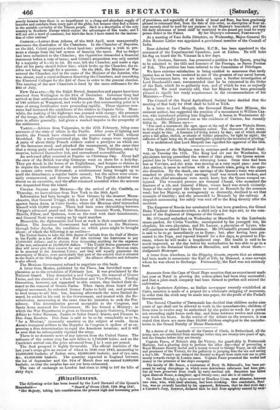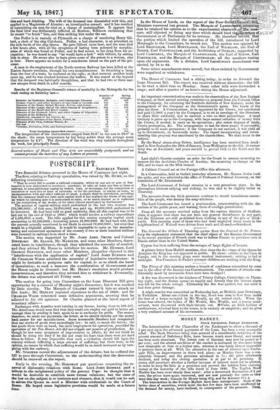Ifliscellantous.
The following order has been issued by the Lord Steward of the Queen's
Household— "Board of Green Cloth, 12th May 1847. "Her Majesty, taking into consideration the present high and increasing price of provisions, and especially of all kinds of bread and flour, has been graciously pleased to command that, from the date of this order, no description of flour ex- cept seconds shall be used for any purpose in her Majesty's household; and that the daily allowance of bread shall be restricted to one pound per head for every person dieted in the Palace. By her Majesty's command, FORTESCUE."
At a meeting of East India Directors, on Wednesday, Major-General Sir John Hunter Littler was appointed a provisional member of the Council of India.
Rear-Admiral Sir Charles Napier, K.C.B., has been appointed to the command of the Experimental Squadron, now at Lisbon. He will hoist his flag on board the St. Vincent in a few days.
Sir R. Graham, Baronet, has presented a petition to the Queen, praying to be admitted to the title and honours of the Peerage, as Baron Preston of Esk. The petition has been referred to the Committee of Privileges.
We have extreme satisfaction in being enabled to announce that tardy justice has at last been rendered to one of the greatest of our naval heroes. The Government have, we are informed, upon a further investigation of Lord Dundonald's case, recommended that he be reinstated in the Order of the Bath, which he so gallantly won, and of which he was so unjustly deprived. We need scarcely add, that her Majesty has been graciously pleased to signify her ready acquiescence in the recommendation of her Ministers.—Times.
The Council of the Royal Agricultural Society have decided that the meeting of that body for 1848 shall be held at York.
In a letter to Lord Morpeth, the Reverend Henry Hart Milman, the eminent author, has suggested the erection of a monument to William Cax- ton, who introduced printing into England. A house in Westminster Al- monry, traditionally pointed out as the residence of Caxton, has recently fallen in. Mr. Mihnan says- " For such a monument the open space at the end of the new Victoria Street, in front of the Abbey, would be admirably suited. The character of the monu- ment might be this. A fountain (of living water) by day; out of which should arise a tall pillar, obelisk, or cluster of Gothic pinnacles, for light by night; the diffusion of light being the fit and intelligible symbol for the invention of printing." It is understood that Lord Morpeth has signified his approval of the idea.
The Queen of the Belgians was in extreme peril on the National Rail- way, on Tuesday the 11th. The King had set out for Wiesbaden, his physicians having prescribed the waters of that place; the Queen accom panied him to Verviers and was returning home. Some time had been lost at Verviers, and the train was moving at a very rapid pace: near the Airs station, it came in oollisiou with a Brussels train, going in the oppo- site direction. By the shock, one carriage of the Queen's train was almost smashed to pieces; the royal carriage itself was struck and broken, and two of the chief attendants were much hurt; but the Queen escaped un- injured. The wounded persons are General Ghazal, who sustained the fracture of a rib, and General d'Hane, whose head was struck violently. Some of the suite urged the Queen to travel to Brussels by the common road; but her Majesty, as courageously as discreetly, declined to set that example of timidity; and she proceeded to Brussels by the railway. A despatch announcing her safety was sent off to the King directly after the accident.
The Emperor of Russia has nominated his last born grandson, the Grand Duke Vladimir Alexandrowitch, a child only a few days old, to the com- mand of the Regiment of Dragoons of the Guard.
Mr. O'Connell embarked on Wednesday at Marseilles in the Lombardo steam-packet, for Civita Vecchia; accompanied by his youngest son, his chaplain, his own physician, and Dr. Laoour, a physician of Lyons, who will continue to attend him to Florence. Mr. O'Connell's present intention is said to be to go immediately on to Rome; but, after having been pre- sented to the Pope, and reposed himself for a few days, to proceed to Flo- rence' where he will make a lengthened stay. His health is said to be much improved, as the day before his embarkation he was able to go in a carriage to the Botanical Gardens at Marseilles, and walk about there.— Galignani's Messenger.
A letter from Aberdeen, in the Shipping Gazette, reports that an attempt had been made to assassinate the Earl of Fife, by Hamond, a man-servant whom he was about to discharge. Fortunately, the Earl was not seriously hurt.
Accounts from the Cape of Good Hope mention that an experiment made last year at Natal in growing the cotton-plant had been very successful; and that a joint-stock company had been formed to perfect and extend the cultivation.
In La Spettatore E,giziano, an Italian newspaper recently established at Cairo, mention is made of a project for a wholesale stripping of mummies, in order that the cloth may be made into paper, for the profit of the Paella's Government.
The Second Chamber of Darmstadt has decided that children under nine years of age shall not be allowed to work in the manufactories; children of from nine to twelve may be authorized by the police to work for a period not exceeding eight hours each day, and those between twelve and sixteen may work ten hours. In the course of the debate on the measure, it was stated that there are more than 10,000 children employed in the manufac- tories in the Grand Dutchy of Hesse-Darmstadt.
By a decree of the Landmth of the Canton of Glaris, in Switzerland, all the young men are interdicted from marriage before they are twenty-two years of age, and the females before they are twenty.
Captain Pasco, of Nelson's ship the Victory, the guard-ship in Portsmouth Harbour, had a pleasing duty to perform the other day—that of presenting a Royal Humane Society medal and a money reward to George Veary, an old sailor and pensioner of the Victory, for his gallantry in jumping into the sea and saving a boy's life. Veary's age induced the Society to depart from their rule not to give money rewards except in London cases. Captain Pasco presented the medal and money in the presence of the ship's company.
The family of Mr. Rouse, a tradesman of Bury St. Edmund's, has been poi- soned by eating dumplings in which some deleterious substance had been put; but all were preserved from death by early medical aid. Suspicion has fallen upon Hannah Rouse, a daughter, aged twenty-one; and she is in custody.
On Easter Monday, a fight occurred at Headless Cross, near Alcester, between two men, who, with their abettors, had been drinking. One combatant, haul ton, was so severely handled by his opponent, Robinson, that he died next day: a Coroner's Jury, however, declared that he died from apoplexy caused by eau-
thin and hard drinking. The wife of the deceased was dissatisfied with this, and applied to a Magistrate of Alcester: an investigation ensued; and it has resulted in committing six men for trial on a charge of manslaughter. It appears that the fatal blow was deliberately inflicted on Bonbon; Robinson exclaiming that he meant "to finish" him, and then striking him under the ear.
One Pedler is in custody at Plymouth on a charge of murdering Henry Gil- bert, a clerk of the ship Caledonia. Pedler, a bad character, is an attendant on the sick-berth of the ship Queen. He gave Gilbert some beer, and the man died a few hours after, with all the symptoms of having been poisoned by morphia; some of which was found on Pedlar, and he had access to the drag from his oc- cupation: he was heard to say "he would have a lark" with Gilbert, by setting him to sleep. He seems also to have given some of the poison to a woman, also in beer. There appears no motive for a murderous intent on the part of the pri- soner.
A man in the employment of the North-western Railway has been killed at the Euston Square terminus, through his own incautiousness. In detaching a lamp from the rear of a train, he ventured on the rails; at that moment another train came up, and he was crushed between the buffers. It was stated at the inquest that the deceased was habitually thoughtless, and that he had two or three nar- row escapes from death in a few months.
Results of the Registrar-General's return of mortality in the Metropolis for the week ending on Saturday last— Number of Spring deaths. average.
Zymotic (or Epidemic, Endemic, and Contagious) Diseases 137 .. . 166 Dropsy, Cancer, and other diseases of uncertain or variable seat 113 .... 99 Diseases of the Brain, Spinal Marrow, Nerves, and Senses l67 ... 168 Diseases of the Lungs, and of the other Organs of Respiration 314 .... 276 Diseases of the Heart and Blood-vessels 6 29 Diseases of the Stomach, Liver, and other Organs of Digestion II " Diseases of the Kidneys, /ie. 12 II
Childbirth, diseases of the Uterus, Sc. 91 10
Rheumatism, diseases of the Bones, Joints, It 11 Mamma of the Skin, Cellular Tissue, Sc. 4 Old Age 65 67 Violence, Privation, Cold, and Intemperance 14 es — . Total (including unspecified muses) 987 914
The temperature of the thermometer ranged front 80.0' in the sun to 28.00 in the shade; the mean temperature by day being colder than the average mean temperature by 429. The direction of the wind was very variable throughout the week, but principally South.



























 Previous page
Previous page